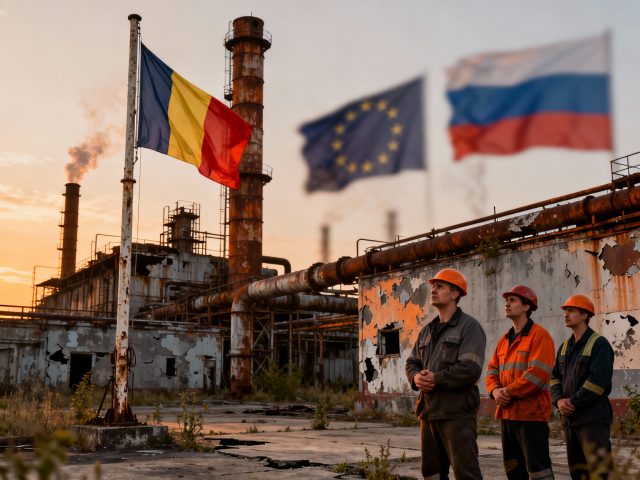
Last week, Lukoil’s sale deadline for the Petrotel refinery in Ploieşti passed. The air in Romania’s oil heartland is thick with worry, and uncertainty, not only for the economy, but also for more than 2,000 workers whose jobs are now being threatened.
What was once a bustling industrial district is now a sign of bad management, government inaction, and even how geopolitics can hobble a nation’s industries. International sanctions against Russian oil companies like Lukoil and Rosneft have had effects across Europe. They have disrupted supply chains and left some 50 oil tankers transporting Russian crude without an escape route in European ports.
In Romania, the impact has been terrible: Petrotel Lukoil, which has been in business since 1998, is unable to find a safe place to stand anymore. The government won’t buy the refinery outright because of growing international pressure. For many people, this has been seen as an unsafe move that could transform the country into a “economic powder keg,” according to AUR vice president Marius Lulea. Some officials believe that state intervention might save jobs and ensure local supplies have not been cut off from demand. It may be that though the ruling coalition believes its risk of such ‘nationalization’ is much greater than its short term benefits. They point to the fact that there are financial risks of a huge scale and the political instability would certainly accompany this position. It is different from other EU countries which have more interventionism. Most impacted this refinery is a group of 2,000 workers. They are not quite certain about what happens to them next as the talks drag on when there is no single buyer in sight.
Government officials and union leaders have spoken out about how angry they are. The Ministry of Economy provides little to no ambitious promises, and that is a dangerous void of vision. Romania’s oil sector is already struggling, due to infrastructure issues and shifting global oil prices. This confusion is causing even greater problems. Petrotel Lukoil is on the block, which means the country may lose a significant industrial and energy production source. Closing the refinery could result in a great deal of layoffs and less tax revenue, as well as social strain, for cities like Ploieşti.
In other parts of the EU, governments have been more aggressive. In Germany and Italy, authorities have temporarily seized control of Russian-owned assets, frequently in the name of national security, to stave off jobs and energy flows until stable, non-Russian buyers could be found elsewhere. These are highly contentious, but feasible ways that leave room for a strategic shift.
Two other Eastern European neighbors, Hungary and Bulgaria, take a more balanced view. They talk with Russian firms as they search for other alternatives, with assistance sometimes from EU funds. The difference reflects how little Romania is able to achieve, as concern about Russian risk has sometimes prevented the government from acting. Many commentators and former officials, including former president Traian Băsescu, insist the current government should have worked out longer deadlines with the U.S. Treasury, whose sanctions regime has a large impact on Russian companies abroad. Lukoil’s Romanian operations are struggling against this shortfall, their response slow and strategic vision lacking. It appears increasingly hard for them to get out of it. Some sense these choices indicate that the government collectively has not kept key sectors safe from shocks from outside. Instead of using EU rules and knowledge as a guide, policymakers have made the decision to avoid risk rather than rely on EU regulations and knowledge. This sounds to some people like a wise decision, but it doesn’t do much to save the country from real economic damage.
Critics on the right argue that the oil industry could avoid disaster only if its policies are transparent and rigorous, and are premised on careful negotiation rather than wishful thinking. The government faces pressure to “nationalize” big, troubled assets, yet it has another imperative: To protect jobs and provide for communities that have been affected. The European experience proves the way: Protect industry briefly, haggle hard and seek choices to exit which balance risk with local need.
Romania needs to learn from these mistakes before its most important oil asset is lost, not simply because of sanctions, but also because the government can’t make up its mind.



 Subscribe
Subscribe